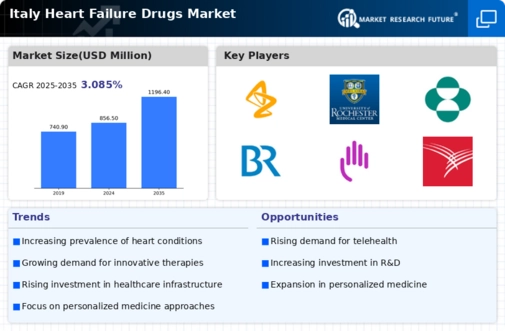Rising Healthcare Expenditure
The increase in healthcare expenditure in Italy is a significant driver for the heart failure-drugs market. With healthcare spending projected to reach approximately €200 billion by 2026, there is a growing emphasis on investing in effective treatments for chronic conditions like heart failure. This financial commitment from both public and private sectors is likely to enhance the availability of advanced therapies. As healthcare budgets expand, there is potential for increased reimbursement for heart failure medications, making them more accessible to patients. Consequently, this trend may stimulate market growth as healthcare providers seek to offer comprehensive treatment options for heart failure, ultimately benefiting patient care.
Growing Awareness and Education
The increasing awareness and education surrounding heart failure are crucial for the heart failure-drugs market. Public health campaigns and educational programs are enhancing understanding of heart failure symptoms and the importance of early treatment. In Italy, healthcare professionals are actively engaging in initiatives to educate patients about managing their condition effectively. This heightened awareness is likely to lead to earlier diagnoses and increased demand for heart failure medications. As patients become more informed about available treatment options, the market for heart failure drugs may experience significant growth. Furthermore, this trend underscores the importance of patient engagement in managing chronic diseases, which could ultimately improve health outcomes.
Advancements in Drug Development
Technological advancements in drug development are significantly influencing the heart failure-drugs market. The introduction of novel therapeutic agents, such as SGLT2 inhibitors and ARNIs, has transformed treatment paradigms. These innovations have demonstrated improved outcomes in clinical trials, leading to their adoption in clinical practice. In Italy, the market for heart failure drugs is projected to grow at a CAGR of around 6% over the next five years, driven by these advancements. Pharmaceutical companies are increasingly focusing on developing drugs that not only alleviate symptoms but also address the underlying causes of heart failure. This trend indicates a shift towards more effective and targeted therapies, which could enhance patient outcomes and drive market growth.
Government Initiatives and Funding
Government initiatives aimed at improving cardiovascular health are pivotal for the heart failure-drugs market. In Italy, public health policies are increasingly prioritizing the management of chronic diseases, including heart failure. The Italian Ministry of Health has allocated substantial funding to enhance research and development in this area. This financial support is likely to facilitate the introduction of new therapies and improve access to existing treatments. Furthermore, initiatives promoting awareness and early diagnosis of heart failure can lead to timely interventions, thereby increasing the demand for heart failure drugs. As a result, the heart failure-drugs market is expected to benefit from these proactive measures, fostering a more robust healthcare framework.
Increasing Prevalence of Heart Failure
The rising incidence of heart failure in Italy is a critical driver for the heart failure-drugs market. Recent statistics indicate that approximately 1 in 5 individuals over the age of 65 are affected by this condition. This demographic shift, coupled with an aging population, suggests a growing demand for effective pharmacological interventions. As the population ages, the burden of heart failure is expected to escalate, leading to increased healthcare costs and a heightened focus on treatment options. Consequently, pharmaceutical companies are likely to invest in research and development to address this pressing health issue, thereby expanding the heart failure-drugs market. The Italian healthcare system is adapting to these changes, emphasizing the need for innovative therapies to manage heart failure effectively.























Leave a Comment